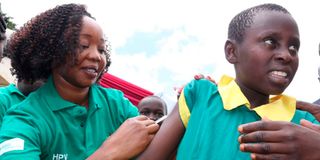Hope as single dose of HPV jab proves to be highly effective

A pupil at Ossen Primary School in Baringo North receives the HPV vaccine in 2019. A trial conducted in Kenya has shown that a new single dose vaccine is highly effective against the virus that causes cervical cancer.
A single dose of the human papillomavirus (HPV) vaccine is cutting cases of cervical cancer by 97.5 per cent, and the efficacy is the same as multiple doses, data shows.
A study done among Kenyan girls aged 15 and 17 years by the Kenya Medical Research Institute (Kemri) showed that one dose of the vaccine was as effective as the current two-dose and three-dose regimens.
The research conducted between December 2018 and June 2021 sampled 2,275 girls in Kenya who were randomly assigned a therapy. Of these, 760 received a bivalent vaccine that covered two strains of HPV (16/18), which represents 70 per cent of cases.
A total of 758 received a nonavalent vaccine that covered seven strains of HPV (16/18/31/33/45/52/58), which represent 90 per cent of cases while the remaining 757 girls received a vaccine that protects against meningitis.
After 18 months, the bivalent vaccine was 97.5 percent effective against HPV 16/18, and so was the nonavalent vaccine.
“The nonavalent vaccine was 89 percent effective against HPV 16/18/31/33/45/52/58. Even if women tested positive for one strain of HPV, the vaccine protected them from other strains of the virus,” says the study.
To be eligible, participants needed to be sexually active, have no more than five lifetime partners, be HIV-negative, and have no history of HPV vaccination.
“This is historic and shows that vaccines are saving lives,” said Dr Nelly Mugo, a co-investigator in the study and a senior principal clinical research scientist with the Centre for Clinical Research at Kemri.
“This trial brings new energy to the elimination of cervical cancer. It brings great hope to the women living in countries like Kenya, who have a high burden of the disease,” she added.
Researchers said one reason for the trial was the cervical cancer ward at the Kenyatta National Hospital – they want it empty.
Worldwide, cervical cancer kills a woman every two minutes, according to World Health Organization (WHO) director-general Tedros Ghebreyesus. Most of these deaths are in Africa, which bears 80 per cent of the cervical cancer burden.
Cervical cancer is the second most common cancer in women in Kenya after breast cancer. According to the International Agency for Research on Cancer (IARC) shows that in 2020, there were 5,236 (19.7 per cent) new cases of cervical cancer in Kenya across women of all ages.
Almost nine in 10 deaths are in low and middle income countries where there is little access to cervical cancer screening.
More than 100 countries have started using the vaccine as part of WHO routine immunisation plans.
The WHO strategy towards elimination of cervical cancer by 2030 envisions 90 per cent of girls will be fully vaccinated against HPV vaccine by 15 years of age, 70 per cent of women are screened with a high-precision test at 35 and 45 years of age, and 90 per cent percent of women identified with cervical disease receive treatment and care.
In Kenya, 10-year-old girls are given the HPV vaccine in two doses six months apart for free. The vaccine has been offered to girls since 2019.
“These findings are a game changer that may substantially reduce the incidence of HPV-attributable cervical cancer and positions single-dose HPV vaccination as a high value and high impact public health intervention that is within reach for us,” said Prof Sam Kariuki, Kemri’s Acting Director-General.
“The single-dose vaccine was highly effective at 18 months for HPV vaccination and the efficacy was the same as multiple doses,” said Dr Ruanne Barnabas, the principal investigator in the study and professor of global health at the University Of Washington.
The single dose vaccine, she said, would simplify logistics and decrease costs.
“I believe that I will see cervical cancer eliminated in my lifetime,” said Dr Maricianah Onono of Kemri. “So, let’s do this, one shot for every woman.”
“A single-dose HPV vaccination schedule could alleviate financial and logistical barriers that we currently face. Kemri will work closely with the Ministry of Health and the researchers in the translation of these findings into action,” Prof Kariuki said.





